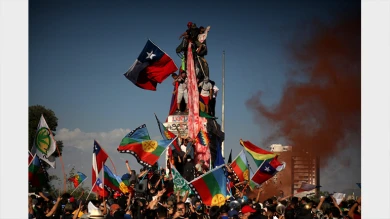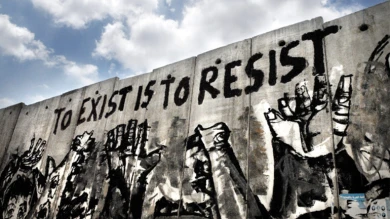-
Programme 1
Militancy and Rebellions
-
Monday, 14 September 2020 – 7pm
Carmen Castillo. Calle Santa Fe
Chile, France, Belgium, 2007, colour, original version in Spanish, 167’
Presented by Carmen Castillo and José Miguel Neira (an artist, teacher and researcher, and a member of the Politics and Aesthetics of Memory Chair’s study group).
In a house on Santa Fe Street in Santiago de Chile, on 5 October 1974, Carmen Castillo is injured and her partner, Miguel Enríquez — head of the Revolutionary Left Movement (MIR) and the resistance against Pinochet’s dictatorship — dies in combat. The film-maker thus embarks on a journey, devoid of nostalgia and indulgence, to the places and scenes of the past, crossing the memory of the vanquished with her own reflection on the meaning of militancy and personal dilemmas. The film entwines her biography as a female activist with the history of a generation of revolutionaries, hard to reconstruct in a country whose transition to democracy has suffocated their memory in considering them subversive.

-
Tuesday, 15 September 2020 / Zoom – 7pm
Conversation between Carmen Castillo and Nelly Richard. Memories of a Rebel
Online platformThis conversation sets up a dialogue between the present (social uprisings, the pandemic) and a history of utopias and resistances that film work edits as a living testimony and critical memory. Carmen Castillo, a pivotal film-maker in the documentary genre, is a professor of History and a researcher at the Centre of Research into Latin American History at the Universidad Católica de Chile. She was also a member of the Revolutionary Left Movement (MIR), and since the 1970s has been a political refugee in France, where she has carried out the bulk of her work. Nelly Richard is a theorist and essayist, the author of monographic works such as La Insubordinación de los Signos: cambio político, transformaciones culturales y poéticas de la crisis (Cuarto Propio, 1994) and Residuos y metáforas. Ensayos de crítica cultural sobre el Chile de la transición (Cuarto Propio, 1998), and academic coordinator of the Museo Reina Sofía’s Politics and Aesthetics of Memory Chair.
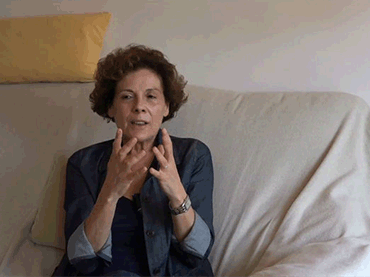
-
Wednesday, 16 September 2020 – 7pm
Carmen Castillo. Aún estamos vivos (We Are Still Alive)
France and Belgium, 2014, colour, original version in French, Spanish and Portuguese with Spanish subtitles, 100’
Presented by Cristina Busto (an art historian, writer and researcher in feminisms, corporalities and memory, and a member of the Politics and Aesthetics of Memory Chair’s study group).
What is political commitment made of today? Is it still possible to change the deadly path the world is on? These are some of the questions set forth in this documentary, which is part of an intimate dialogue with Daniel Bensaïd, the now-deceased colourful French philosopher and activist with whom Castillo embarked on a journey around different territories and geographies, leading her to cross paths with people who are unaccepting of the world imposed upon them — the homeless of Paris, the Landless Workers of Brazil, Mexican Zapatistas, settlers in the working class neighbourhoods of northern Marseille, Bolivian Water Warriors, unionists from Saint-Nazaire. All of these people are part of a collective development born of frustrations and defeats, yet also, above all else, hope and forces of change reactivated by the will to act and the desire to imagine other possible worlds.
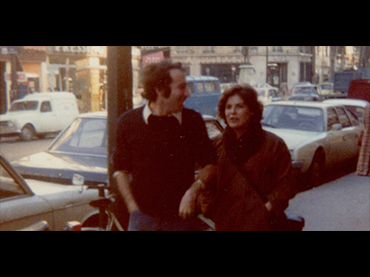
-
Monday, 21 September 2020 – 7pm
Assembling the Fragments of a Broken Past
-
Monday, 21 September 2020 – 7pm
Albertina Carri. Los rubios (The Blonds)
Argentina, 2003, colour and b/w, original version in Spanish, 90’
Presented by Eugenia Bournot (an art historian and cultural manager whose research focuses on artistic processes in totalitarian regimes) and Janaina Carrer (an artist and researcher currently studying a PhD in Arts at the University of Castilla La Mancha, and with an MA in Performing Arts and Visual Culture). Both are members of the Politics and Aesthetics of Memory Chair’s study group.
The family history of Albertina Carri — her father and mother, both left-wing sociologist activists, disappeared during the dictatorship in Argentina — is related via an essay film. Carri pushes the possibilities of the documentary device to its creative limit: an actress, who plays the film-maker, narrates the story; the film crew intervene in the narrative construction, discussing the significant options of the film; a children’s toy — the playmobil, with its spaces: a farm, house, car — is used to recreate a childhood interrupted by disappearance.
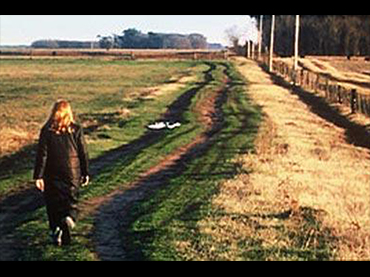
-
Wednesday, 23 September 2020 – 7pm
Macarena Aguiló y Susana Foxley. El edificio de los chilenos (The Chilean Building)
Belgium, Chile, Cuba and France, 2011, colour, original version in Spanish, 95’
Presented by Marcelo Expósito (an artist and theorist whose work centres on the relationships between art, society and politics, researching post-dictatorship memory in artistic investigations).
The Revolutionary Left Movement (MIR) militants who were exiled in Europe were called to return to Chile clandestinely in the late 1970s to participate in the resistance against Pinochet. It was at that juncture that a project surfaced to leave sixty minors — the director of the documentary included — in a community home in Cuba, under the leadership of a group of MIR militants undertaking the role of educators, or “social parents”. The film conveys the narrative thread of this story of families torn apart and later reunited, with its documentary and testimony material enabling it to recreate the complexity of the political and affective fabric of such an innovative and revolutionary project that started to run out of steam in parallel with the failure of the MIR’s political programme in the 1980s.
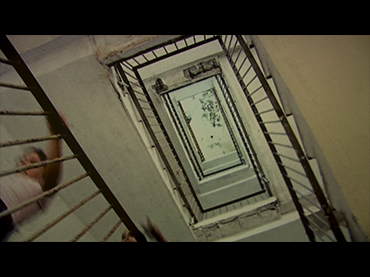
-
Programme 3
Dictatorships, Exile and Resistance
-
Thursday, 24 September 2020 – 7pm
José María Berzosa. Pinochet et ses troix généraux (Pinochet and His Three Generals)
France, 1979, re-edited in 2004, colour, original version in Spanish with French subtitles, 101’
Presented by Chema González (head of the Museo Reina Sofía’s Cultural and Audiovisual Activities).
A Spanish exile depicts Pinochet and Pinochetism in the hardest years of military repression in Chile, drawing from the power of satire to ridicule authoritarianism and its image. José María Berzosa associates two dictators worthy of repudiation who, as declared by the bishop to Chile’s armed forces at the beginning of the film, resemble one another: Franco and Pinochet. The intimate, day-to-day portrait of members of the Military Junta demonstrates the nuts and bolts of the psychology and tastes of its generals, dressed in full military splendour, with Berzosa contrasting this gallery of sinister portraits with the caustic trail of the memory of the disappeared and the suffering of the Chilean people fighting the dictatorship in the streets.
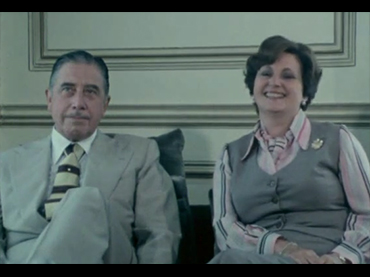
-
Friday, 25 September 2020 – 7pm
Margarita Ledo. Santa Liberdade (Holy Liberty)
Spain, Venezuela, Brazil and Portugal, 2004, colour, original version in Galician, Portuguese, English and Spanish with Spanish subtitles, 88’
Presented by Margarita Ledo.
Margarita Ledo’s audiovisual work re-assembles the main traces of the history of the Spanish Civil War and dictatorship, piecing together micro-stories which render an account of the persistence of memory. In Santa Liberdade, Ledo spotlights the anti-Franco and anti-Salazar resistance in the early 1960s, compiling a forgotten yet hugely revealing history that disputes the theory that an active anti-Franco movement never existed. A group of Portuguese and Spanish insurgents, former exiles from the dictatorships trained in Cuba and Venezuela, hijack a commercial ocean liner. On board, they exercise a libertarian republic and hand out passports from a new Iberian federation, with the boat setting its course for the coasts of Guinea and Cape Verde to fraternise with the local people and reject, head-on, Spanish and Portuguese colonialism.
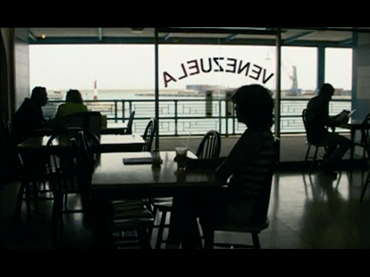
-
Programme 4
Dramaturgies of Memory
-
Monday, 28 September 2020 – 7pm
Eloy Enciso. Longa noite (Long Night)
Spain, 2019, colour, original version in Galician with Spanish subtitles, 90’
Presentation and conversation by Eloy Enciso and Misha Bies Golas, visual artist and main actor in Longa Noite.
In the wake of the Spanish Civil War, Anxo returns to his home in the Galician countryside, where he comes across other figures, the victors and the defeated in a divided Spain: a widow who doesn’t wish to remember, a tradesman who is emigrating, a Republican prisoner who describes his ordeal. The delivery of a letter forces Anxo to cross borders and become engulfed in a long Francoist night, where the ghosts many thought were forgotten invade the present. The documentary construction of the film is assembled through letters, documents extracted from civil archives and the writings of Spanish exiles like Max Aub, Luis Seoane, Alfonso Sastre and Ramón de Valenzuela. The dramaturgy of Long Night reconstructs the emotional landscape of Francoist repression via amateur actors, children of exiles and the victims of reprisals who embody these transfigurations of memory.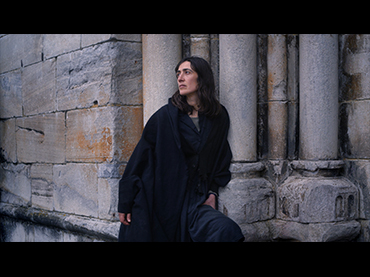
-
Wednesday, 30 September 2020 – 7pm
Lola Arias. Teatro de guerra (Theatre of War)
Argentina, Spain and Germany, 2018, colour, original version in Spanish, English and Nepalese with Spanish subtitles, 77’
Presented by Estefanía Santiago (a professor in Audiovisual Communication with an MA in Art and Documentary Photography) and María Sabato (an artist whose work is concerned with public art). Both are members of the Politics and Aesthetics of Memory Chair’s study group.
The work of Lola Arias, a pre-eminent artist on the experimental theatre scene, sets out from documentary theatre and contemporary performance to put together a creative manifesto, rendering an account of how the indoctrination and massacre that occurred during the Falklands War created false patriotic meaning among Argentineans during the dictatorship. Arias convenes two groups of ex-fighters, British and Argentinian, and asks them to live together to re-live battle scenes. As memory issues forth, divested of the patriotic framework of the era, the protagonists become aware of the futility of war and the manipulation to which they were subjected via the intersubjective reconstruction prompted by Arias’s theatre and film exercise.
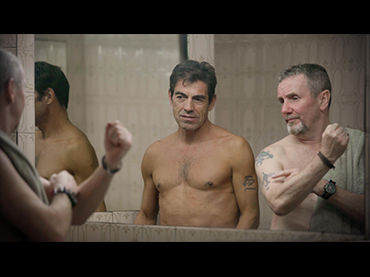
-
Programme 5
Marginalisation and Sexual Dissidence
-
Thursday, 1 October 2020 – 7pm
Joanna Reposi. Lemebel
Chile and Colombia, 2019, colour, original version in Spanish, 96’
Presented by Carolina Piña Araya (a psychologist and activist working in art from a gender and human rights perspective), a member of the Politics and Aesthetics of Memory Chair’s study group.
Pedro Lemebel, a member of the collective Las Yeguas del Apocalipsis and a chronicler and performer, possessed an unmistakeably bold and subversive voice which, from the peripheral figure of the “loca”, or the queen, he introduced the theme of sexual dissidence in the Left’s discourse against Pinochet’s dictatorship at the end of the 1980s, before confronting the cultural officialism of neoliberal transition. The body, blood and fire were the insurgent materials incorporated into the art actions which, the last eight years he was alive, Lemebel wanted to record in a film he would unfortunately never see. This intimate and political journey Joanna Reposi shares with Lemebel recreates and reflects on his risqué performances on homosexuality and human rights.
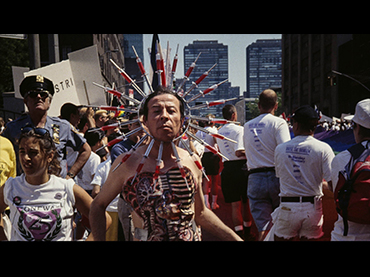
-
Friday, 2 October 2020 – 7pm
Els 5QK’s. Cucarecord
Spain, 1977, colour, original version in Spanish, 7’
Ventura Pons. Ventura Pons. Ocaña, Intermittent PortraitSpain, 1978, colour, original version in Spanish, 78’
Presented by Ventura Pons, filmmaker, Janaina Carrer (an artist and researcher currently studying a PhD in Arts at the University of Castilla La Mancha) and Rodrigo Montaño (an art historian concerned with subjectivity and memory in contexts of political violence). Both are members of the Politics and Aesthetics of Memory Chair’s study group.
The focus of this session is on queer resistance, parties as rebellion during the dictatorship, carnival and transvestite identities, and the satire of heterosexual codes through pantomime. It begins with a collective of amateur film-makers (Enric Bentz, Luis Escribano, Ces Martí, Ramón Massa and Alfonso de Sierra) that decided to come together in 1975, and presents their transgressive filmography from the underground camp scene, operating around the time of the “Danger to Society” Law in Spain. This is followed the portrayal of José Pérez Ocaña’s life in the documentary portrait made by Ventura Pons, in which we see the diva, the transgressive flamenco dancer, mixed with the charnego, the worker from Andalusia who emigrates to Barcelona in a claim for freedom for the eccentric margins of difference.
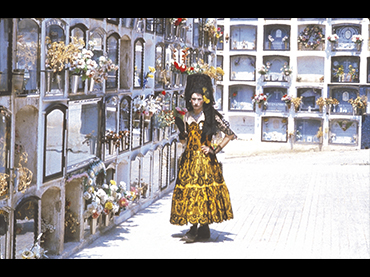
-
Sunday, 4 October 2020 - 7 pm
Agustina Comedi. Silence Is a Falling Body
Argentina, 2017, colour, original version in Spanish, 72’
Presented by Guillermina Mongan (a researcher of corporalities, networks, politics and art who is currently working as an archivist in the crew for the next film by Agustina Comedi).
In this feature-length film, Agustina Comedi explores the fracture between political militancy and the homosexuality of her father. By way of a sensitive archive of home movies in 8mm and VHS, recorded and gathered by her father, Jaime, over a number of years, it delves into various family secrets and reticence from an ethical standpoint that respects silence as it entwines family and collective histories. A political-sexual fissure that shakes the classical concepts of left-wing resistance from an individual biography at odds with the historical and social sensibility of the era.
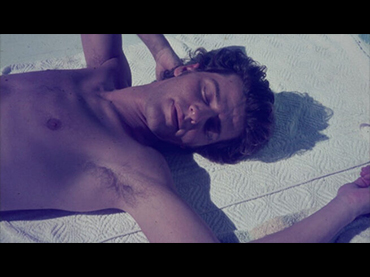
Memory’s Re-volts
Documentary Film in the Aftermath of Dictatorships in Spain, Chile and Argentina
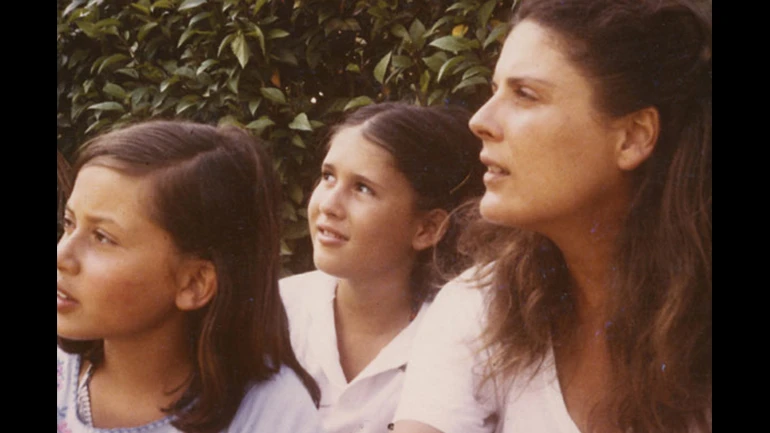
Held on 14, 21, 23, 24, 25, 28, 30 Sep, 01, 02, 04 Oct 2020
By way of documentaries and essay films, this series sets forth different ways of approaching memory to explore the different zones of conflict between subjectivity and politics; between militancy and revolutions; between critical sexualities and gender transformations; between memory and democracy; between social defiance, constituent drives and tasks to reinvent the present.
Argentina, Chile and Spain all share the historical experience of enduring the turmoil of dictatorships, their traumatic memories seeping into individual and collective biographies exposed to military terror, censorship and repression, torture, disappearances and exile. This series, therefore, puts forward different exercises to avoid memory becoming stuck in the past, upon recalling or denouncing, whilst also exploring the temporary strata teeming with cracks, bifurcations and nooks. It is in this set of essays and documentaries where gazes mindful of the furrows of history and the creases of memory converge: inquisitive and creative memory that transcends the monumental format to penetrate fragmented narratives, fields of peripheral vision, in corporeal and affective micro-territories of wounded identities that permit doubt and estrangement as part of the reconfiguration of historical and personal memory. The programme is also traversed by a reflexive gaze, understood from the double meaning referred to by theorist Ana Amado: “Reflexive through the tendency to incorporate elements of filmic language into representation and, also, through an appeal to the critical judgement of the spectator, less conditioned by the simple sentimental or emotional identification with narrated events”.
Some of the sessions in the series are presented by members of the Politics and Aesthetics of Memory Chair’s study group, who have met regularly over the last two years under the coordination of Nelly Richard.
Force line
Politics and Aesthetics of Memory
Más actividades

Difficulty. Forms and Political Effects of Deviation in Writing and Contemporary Art
23 February – 14 December 2026 – Check programme
Difficulty. Forms and Political Effects of Deviation in Writing and Contemporary Art is a study group aligned towards thinking about how certain contemporary artistic and cultural practices resist the referentiality that dominates the logics of production and the consumption of present-day art. At the centre of this proposal are the concepts of difficulty and deviation, under which it brings together any procedure capable of preventing artistic forms from being absorbed by a meaning that appears previous to and independent from its expression. By ensuring the perceptibility of their languages, difficulty invites us to think of meaning as the effect of a signifying tension; that is, as a productive and creative activity which, from the materiality of art objects, frees aesthetic experience from the representational mandate and those who participate in it from the passiveness associated with tasks of mimesis and decoding.
The economy of the referential norm translates the social logic of capitalism, where insidious forms of capturing subjectivity and meaning operate. In the early 1980s, and adopting a Marxist framework, poet Ron Silliman highlighted how this logic entailed separating language from any mark, gesture, script, form or syntax that might link it to the conditions of its production, rendering it fetichised (as if without a subject) and alienating its users in a use for which they are not responsible. This double dispossession encodes the political strategy of referential objectivity: with no subject and no trace of its own consistency, language is merely an object, that reality in which it disappears.
The political uses of referentiality, more sophisticated today than ever before, sustain the neoliberal-extractivist phase of capitalism that crosses through present-day societies politically, economically and aesthetically. Against them, fugitive artistic practices emerge which, drawing from Black and Queer studies and other subaltern critical positions, reject the objective limits of what exists, invent forms to name what lies outside what has already been named, and return to subjects the capacity to participate in processes of emission and interpretation.
Read from the standpoint of artistic work, the objective capture of referentiality may be called transparency. Viewed from a social contract that reproduces inequality in fixed identity positions, transparent in this objectivity are, precisely, the discourses that maintain the status quo of domination. Opposite the inferno of these discourses, this group aims to collectively explore, through deviant or fugitive works, the paradise of language that Monique Wittig encountered in the estranged practices of literature. For the political potency of difficulty — that is, its contribution to the utopia of a free language among equals — depends on making visible, first, its own deviations; from there, the norm that those deviations transgress; and finally, the narrowness of a norm which in no way exhausts the possibilities ofsaying, signifying, referring and producing a world.
From this denouncement of referential alienation, fetishisation and capture, Difficulty. Forms and Political Effects of Deviation in Writing and Contemporary Art turns its attention to the strategies of resistance deployed by contemporary artists and poets. Its interest is directed towards proposals as evidently difficult or evasive as those of Gertrude Stein, Lyn Hejinian, Theresa Hak Kyung Cha, Kameelah Janan Rasheed, Kathy Acker, María Salgado and Ricardo Carreira, and as seemingly simple as those of Fernanda Laguna, Felix Gonzalez Torres and Cecilia Vicuña, among other examples that can be added according to the desires and dynamics of the group.
The ten study group sessions, held between February and December, combine theoretical seminars, work with artworks from the Museo Reina Sofía’s Collections and exhibitions, reading workshops and public programs. All these formats serve as spaces of encounter to think commonly about certain problems of poetics — that is, certain political questions — of contemporary writing and art.
Difficulty. Forms and Political Effects of Deviation in Writing and Contemporary Art inaugurates the research line Goodbye, Representation, through which the Museo Reina Sofía’s Studies Directorship seeks to explore the emergence of contemporary artistic and cultural practices which move away from representation as a dominant aesthetic-political strategy and redirect their attention toward artistic languages that question the tendency to point, name and fix, advocating instead for fugitive aesthetics. Over its three-year duration, this research line materializes in study groups, seminars, screenings and other forms of public programming.

27th Contemporary Art Conservation Conference
Wednesday, 4, and Thursday, 5 March 2026
The 27th Contemporary Art Conservation Conference, organised by the Museo Reina Sofía’s Department of Conservation and Restoration, with the sponsorship of the Mapfre Foundation, is held on 4 and 5 March 2026. This international encounter sets out to share and debate experience and research, open new channels of study and reflect on conservation and the professional practice of restorers.
This edition will be held with in-person and online attendance formats, occurring simultaneously, via twenty-minute interventions followed by a five-minute Q&A.
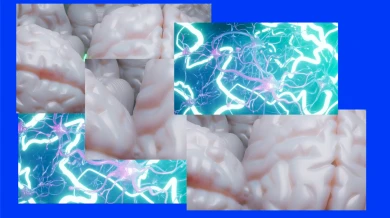
Cultural Work
Thursday, 12 February 2026 – 5:30pm
This series is organised by equipoMotor, a group of teenagers, young people and older people who have participated in the Museo Reina Sofía’s previous community education projects, and is structured around four themed blocks that pivot on the monstrous.
Session number two looks to approach film as a place from which cultural work is made visible and processes of production engage in dialogue with artistic creation. From this premise, the session focuses on exploring how audiovisual content is produced, assembled and distributed, from the hands that handle the images to the bodies that participate in its circulation. The aim is to reflect on the invisible effort, precarity and forms of collaboration that uphold cultural life, that transform the filmic experience into an act that recognises and cares for common work.

Alberto Greco. Viva el arte vivo
Tuesday, 10 February 2026 – 7pm
In conjunction with the opening of the exhibition Alberto Greco. Viva el arte vivo, Fernando Davis, the show’s curator, and Amanda de la Garza, the Museo Reina Sofía’s deputy artist director, will converse in the Nouvel Building’s Auditorium 400 on the life and work of the Argentinian artist, a core figure in experimental avant-garde art.
The title of both exhibition and conversation originates from the proclamation “Long Live Arte Vivo” Alberto Greco (Buenos Aires, 1931— Barcelona, 1965) disseminated around the streets and on the walls of Rome. For Greco, arte vivo was an art of the future, an art based on a set of irreverent and untimely gestures, of adventures open to unpredictability melding with life, and which began in 1962, prior to his coining of the term “vivo-dito”. In his Manifiesto dito dell´arte vivo (Dito Arte-Vivo Manifesto), which he pasted on the walls of Genoa, Greco encouraged new contact “with the living elements of our reality: movement, time, people, conversations, smells, rumours, places, situations”. He would also burst into the everyday of Madrid’s streets as he convened a “vivo-dito moment”, culminating in the burning of a canvas painted collectively in Madrid’s Lavapiés neighbourhood.
In addition to founding arte vivo, Alberto Greco was an informalist painter, a queer flâneur, a poet and sometime actor. This intense journey of Greco’s life and art is closely connected to the migrant route he embarked upon in 1950 in Buenos Aires, taking in Atacama and Humahuaca, Paris, Rio de Janeiro, São Paulo, Genoa, Rome, Madrid, Piedralaves, New York and Ibiza and ending abruptly in Barcelona, where he took his own life shortly after writing his final great work, the novel Besos brujos (Bewitching Kisses, 1965).
These inaugural conversations, part of the main working strands of the Museo’s Public Programmes Area, aim to explore in greater depth the exhibition narratives of the shows organised by the Museo from the perspective of artists, curators and specialists.
![Basel Abbas y Ruanne Abou-Rahme, At Those Terrifying Frontiers Where the Existence and Disappearance of People Fade Into Each Other [En esas fronteras aterradoras donde la existencia y la desaparición de personas se disuelven entre sí], 2019](https://recursos.museoreinasofia.es/styles/small_landscape/public/Colecci%C3%B3n/abbasabourahme.png.webp)
Gaza and Aestheticide
Tuesday February 10, 2026 – 16:00 h
“This seminar examines the systematic destruction of Palestinian collective sensibility — what we might call ‛aestheticide’ — that has accompanied Israel’s genocide and ecocide in Gaza, and considers the conditions of artistic practice in its aftermath. Over more than two years, the demolition of universities, archives, museums, and libraries has not only erased cultural and intellectual infrastructure but has also targeted the very possibility of representation itself. The destruction of a people has been accompanied by the destruction of their image, their history, and their capacity to be known: reportage, scholarship, and cultural memory have been deliberately undermined, with media institutions, universities, and museums often complicit in this repression. Gaza consequently functions as a rehearsal space for a possible global future — of fascism, post-liberal authoritarianism, militarized borders, and AI-enabled warfare —, a laboratory for an emerging world order. What, then, becomes of critical analysis and resistance under these conditions? And what becomes of aesthetics and politics?”
—T.J. DemosThis seminar takes place thanks to the art historian’s invitation to Spain by the Miró Foundation. In the context of the museum, it engages in dialogue with a broader line of work on the climate emergency and decolonial perspectives developed within the Museum of the Commons project (2023–2026) of the L’Internationale network, of which the Museo Reina Sofía is a member; as well as with some of the questions that animate the study group Aesthetics of Peace and Desertion Tactics. Finally, it is also embedded in a wider strategy of support for and commitment to the artistic and discursive practices of Palestinian artists and cultural practitioners, most clearly reflected in the TEJA network.
